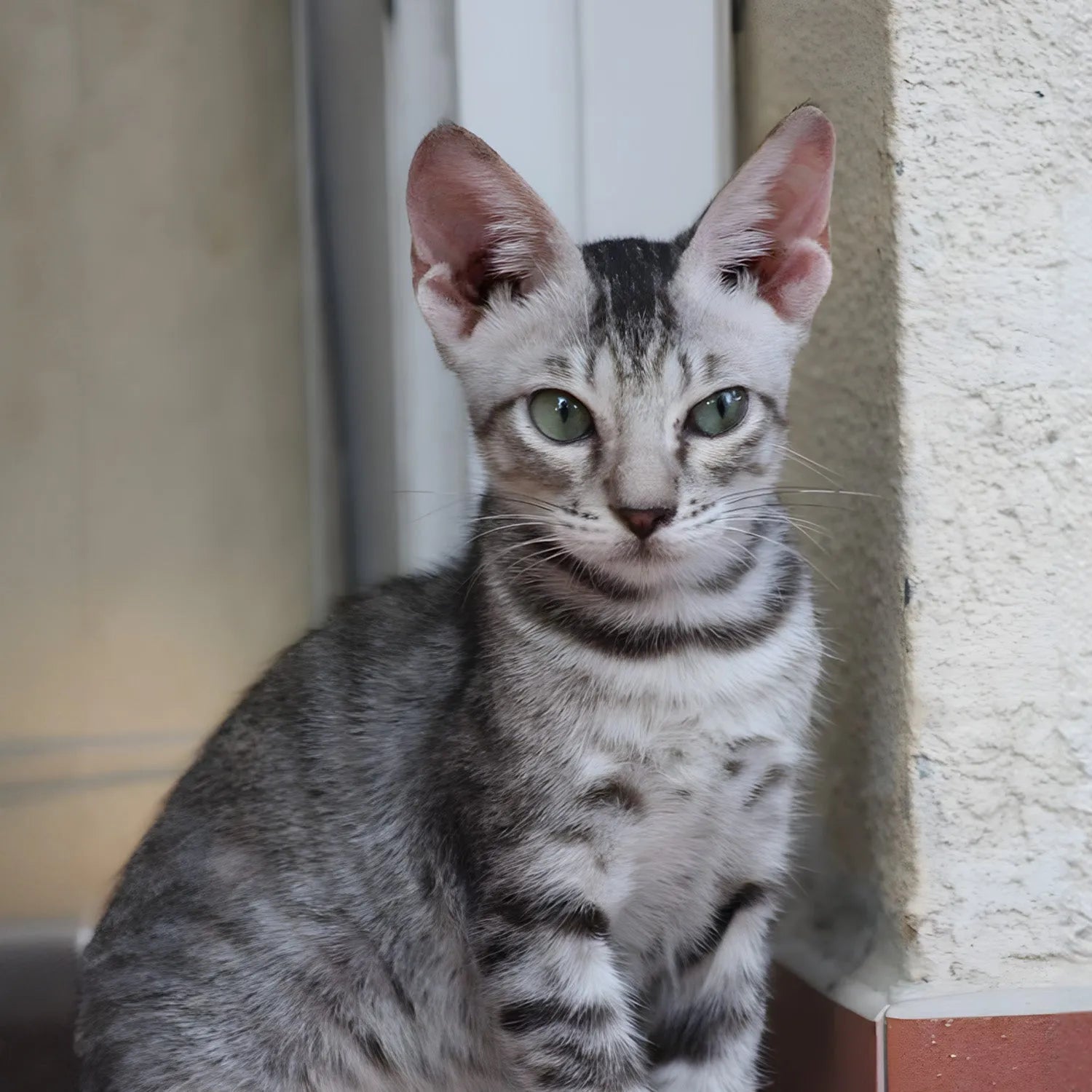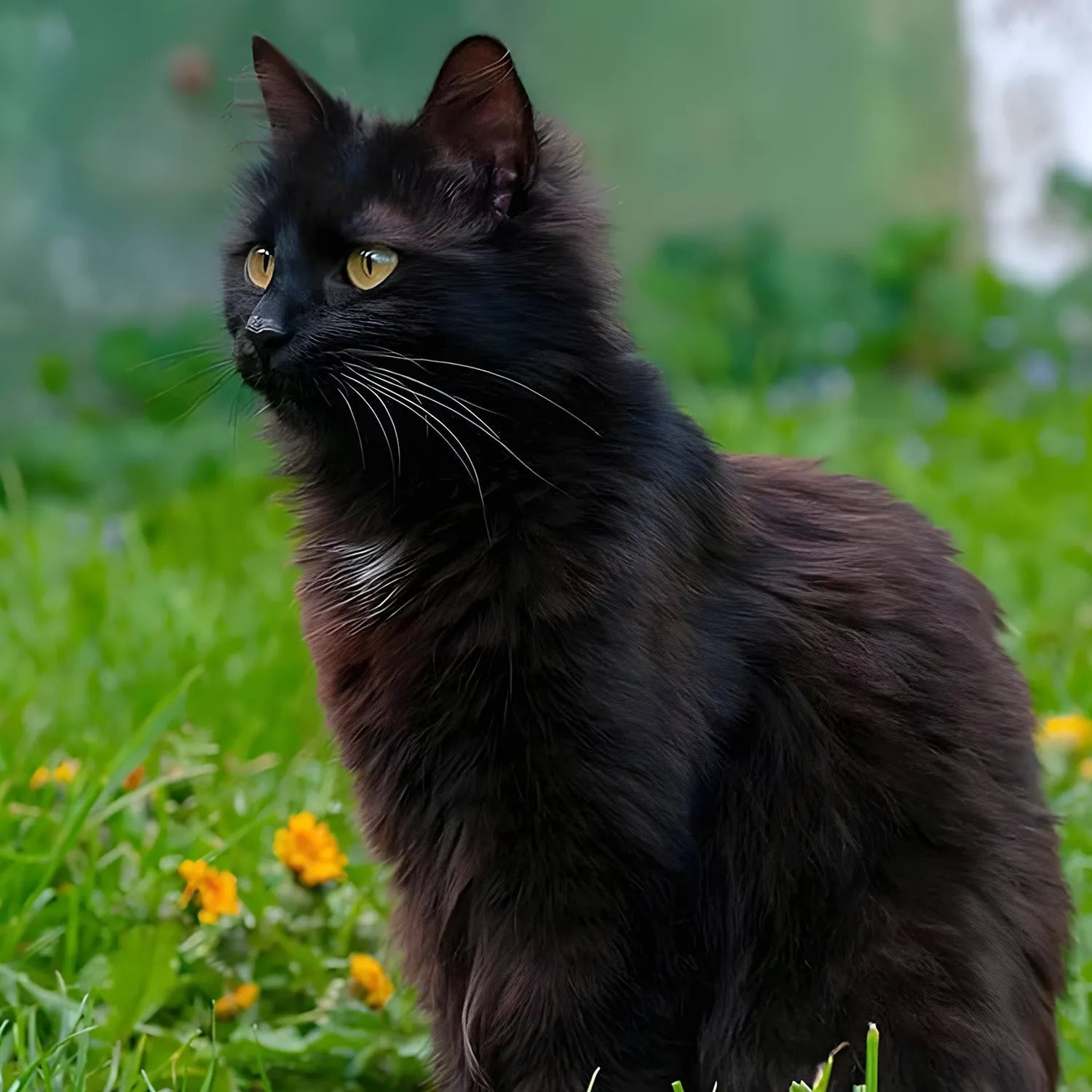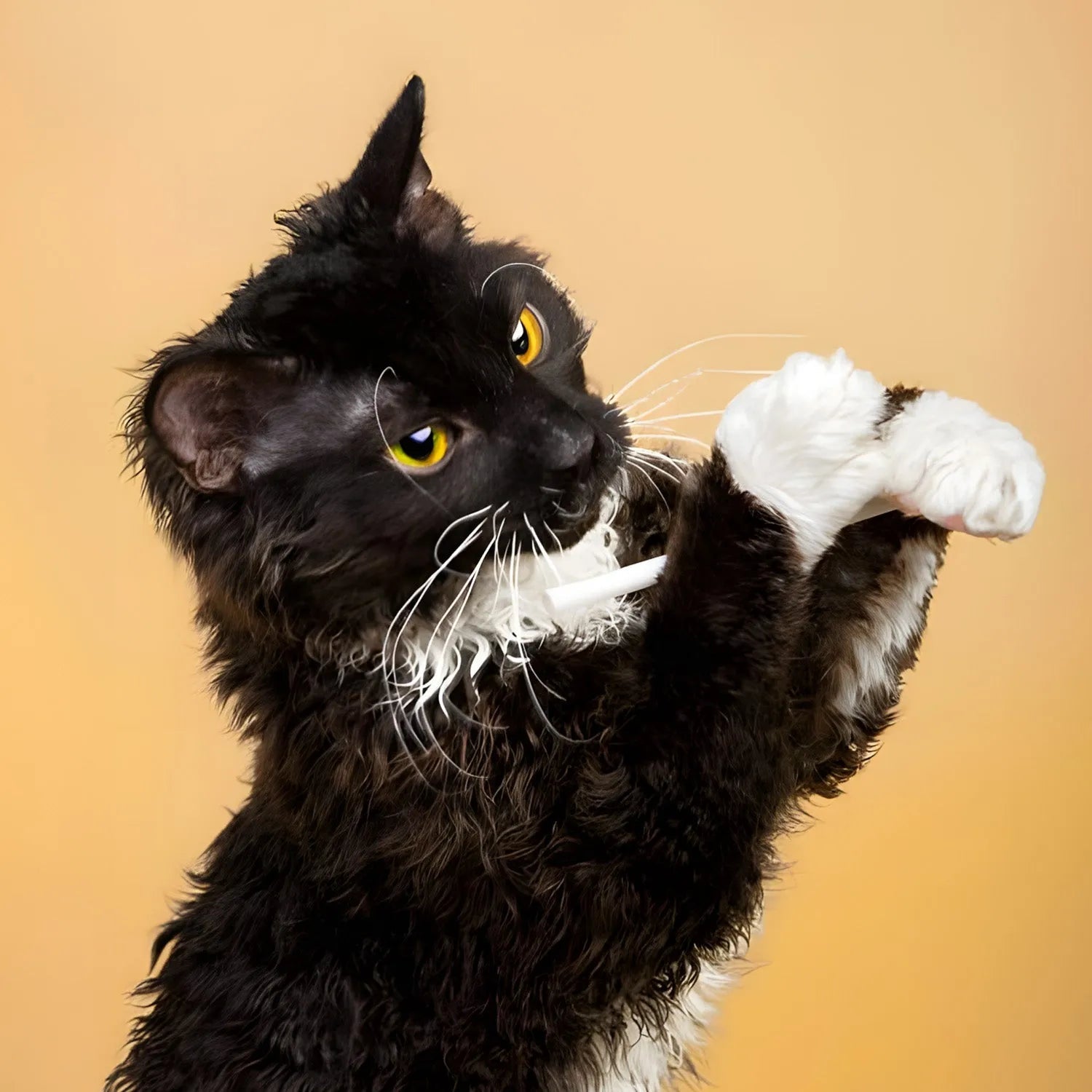Toyger: The Miniature Tiger with a Big Personality
Introduction
The Toyger cat is a designer breed with one main goal: to resemble a miniature tiger. With its bold stripes, muscular body, and wild appearance, the Toyger captures the essence of a tiger in a much smaller, domesticated form. But there’s more to the Toyger than just looks—these cats are known for their playful, friendly, and outgoing personalities, making them fantastic companions for families, singles, and anyone looking for an energetic and social feline friend. In this blog, we’ll explore the Toyger cat’s lifestyle, behavior, grooming needs, and how it interacts with humans and other pets.
Ratings (1-5)
-
Environmental Adaptability: 4
-
Food Consumption: 4
-
Need for Companionship: 5
-
Trainability: 5
-
Tolerance of Children: 5
-
Ease of Domestication: 5
History and Origins
The Toyger is a relatively new breed, developed in the 1980s by breeder Judy Sugden in the United States. Sugden wanted to create a cat that not only had the bold stripes of a tiger but also reflected the wild beauty of this majestic big cat. By selectively breeding Bengal cats with domestic shorthairs, Sugden achieved a breed that displayed bold, tiger-like markings with a muscular build. The breed was named “Toyger” to reflect its resemblance to a "toy tiger."
The Toyger has since gained recognition by The International Cat Association (TICA), and while still a rare breed, its popularity continues to grow among cat enthusiasts who admire its striking appearance and playful personality.
Physical Characteristics and Colors
The Toyger is medium to large in size, with a muscular, athletic build. Its body is long, sleek, and powerful, similar to the structure of a wild cat. Toygers have a broad chest, strong legs, and a long, muscular tail. Their heads are slightly rounded with small to medium ears, giving them a balanced, regal appearance.
One of the most striking features of the Toyger is its coat, which is short, dense, and luxurious. The coat is covered in bold, vertical stripes that mimic the look of a tiger. These stripes are typically dark brown or black, set against a background of golden, orange, or bronze hues, creating a sharp contrast that enhances the tiger-like appearance.
Common coat characteristics of the Toyger:
-
Bold Black/Brown Stripes: Distinct, vertical stripes that are reminiscent of tiger markings.
-
Orange-Gold Base Color: A warm, rich background color that resembles a tiger’s natural coat.
-
Glittering Effect: Some Toygers have a shimmering or "glittering" effect in their coat, which adds to their striking beauty.
Lifestyle and Behavior
Toyger cats are known for their playful, energetic, and outgoing personalities. Despite their wild appearance, Toygers are incredibly friendly and affectionate cats that love spending time with their human companions. These cats thrive on interaction and are happiest when they are involved in family activities, whether it’s playing with toys, exploring new environments, or simply lounging with their owners.
Toygers are highly active and enjoy climbing, jumping, and playing games that challenge their agility and intelligence. They are also very social and will often follow their owners around the house, curious about everything going on. These cats love to be the center of attention and will happily engage in interactive play or snuggle up with their family members when they’re ready to relax.
Because of their high energy levels, Toygers need plenty of physical and mental stimulation to stay happy. Interactive toys, puzzle feeders, and climbing structures are great ways to keep them engaged and entertained. Toygers are also known for their love of water, and some may even enjoy playing in or around water sources, such as a shallow pool or a running faucet.
Trainability and Intelligence
Toygers are highly intelligent cats and can be trained to follow commands, perform tricks, and even walk on a leash. Their playful and curious nature makes them eager to engage in training sessions, and they respond well to positive reinforcement techniques, such as treats and praise.
Because of their intelligence, Toygers need regular mental stimulation to prevent boredom. Puzzle toys, interactive feeders, and games that challenge their problem-solving skills are excellent ways to keep their minds sharp. Toygers also enjoy learning new tricks and commands, and they can be taught to fetch, open doors, or even navigate obstacle courses.
Training sessions with Toygers should be fun and interactive, as they thrive on attention and enjoy showing off their abilities. These cats are eager to please and love the challenge of learning new things, making them ideal candidates for leash training or more advanced tricks.
Toyger cats are incredibly social and affectionate, forming strong bonds with their human family members. They are known for being loyal, loving, and always eager to be near their owners. These cats are not shy about seeking attention and will often nuzzle, paw, or vocalize when they want to be petted or played with.
Toygers thrive on human interaction and do not like being left alone for long periods. They are happiest in homes where someone is around for most of the day, or they have other pets to keep them company. These cats are known for their love of physical contact and will often curl up in their owner’s lap or snuggle beside them in bed.
Their social nature also extends to visitors and strangers. Toygers are generally friendly and outgoing, greeting guests with curiosity and enthusiasm. They are not shy or reserved, making them excellent companions for homes with a lot of activity or visitors.
Compatibility with Children and Other Pets
Toyger cats are excellent companions for children due to their playful and tolerant nature. They enjoy interactive play and are generally patient with children’s antics, provided they are treated with respect. Toygers are gentle and affectionate, making them ideal pets for families with young kids who want an active and loving companion.
In addition to being good with children, Toyger cats also tend to get along well with other pets, including dogs. Their confident and friendly nature allows them to integrate well into multi-pet households, and they often enjoy the company of other animals. Proper introductions are important, but Toyger cats are generally accepting of new furry family members and are known for their ability to get along with both cats and dogs.
Grooming and Care
The grooming needs of a Toyger cat are minimal due to their short, sleek coat. Weekly brushing is usually sufficient to remove loose hairs and keep their coat looking shiny and healthy. Because their fur is short and close-lying, Toyger cats are not prone to excessive shedding or matting, making them a low-maintenance choice for pet owners.
In addition to regular brushing, Toyger cats require routine dental care, ear cleaning, and nail trimming to maintain their overall health. Their low-maintenance grooming needs make them ideal for owners who want a beautiful yet easy-to-care-for cat.
Health and Lifespan
Toyger cats are generally healthy, but like all breeds, they can be prone to certain genetic health conditions. Some common health concerns include heart disease, such as hypertrophic cardiomyopathy (HCM), and other genetic conditions that can affect their overall well-being. Responsible breeders screen for these conditions to reduce the risk of passing them on to future generations.
Regular veterinary check-ups, a balanced diet, and maintaining a healthy weight are essential to keeping your Toyger cat in good health. With proper care, Toyger cats typically live 12-15 years or more, making them long-term companions for any family.
Environmental Adaptability
Toyger cats are adaptable and can thrive in a variety of living environments, whether in a small apartment or a larger home. They are particularly well-suited to indoor living, where they can enjoy a calm and predictable routine. Because of their social and affectionate nature, Toyger cats do best in homes where they have plenty of interaction with their human family members or other pets.
Because of their playful and curious nature, Toyger cats appreciate having access to climbing trees, interactive toys, and plenty of opportunities for play. While they can adapt to most living situations, they are happiest in environments where they receive plenty of attention and stimulation.
Feeding Requirements
A balanced diet is crucial for maintaining the health and energy levels of Toyger cats. High-quality cat food that is rich in protein is recommended to support their muscular build and overall well-being. Fresh water should always be available. Because Toyger cats are active and energetic, it’s important to monitor their food intake to ensure they are receiving the proper nutrition to support their activity levels.
Consult your veterinarian for specific dietary recommendations based on your cat's age, weight, and health needs. Regular play sessions and activities that encourage physical movement can also help keep your Toyger healthy and fit.
Conclusion
The Toyger is a stunning, playful,
and affectionate breed that offers a perfect combination of wild beauty and friendly companionship. Their strong bonds with their human companions, combined with their energetic and outgoing personalities, make them wonderful pets for families, individuals, or anyone looking for a lively and loving cat. If you're searching for a feline friend that looks like a miniature tiger and will bring joy, energy, and affection to your home, the Toyger may be the perfect fit.
For more information about other cat breeds and pet care tips, stay tuned to our blog!
References:
-
Davis, M. (2021). "The Tiger-Inspired Toyger Cat." *Journal of Feline Studies*, 35(3), 215-230.
-
Thompson, A. (2020). "Caring for Your Toyger: A Comprehensive Guide." *Cat Lover’s Magazine*, July issue, pp. 25-33.
-
Harris, E. (2019). "Health and Wellness in Toyger Cats." *Veterinary Journal*, 79(2), 123-137.


